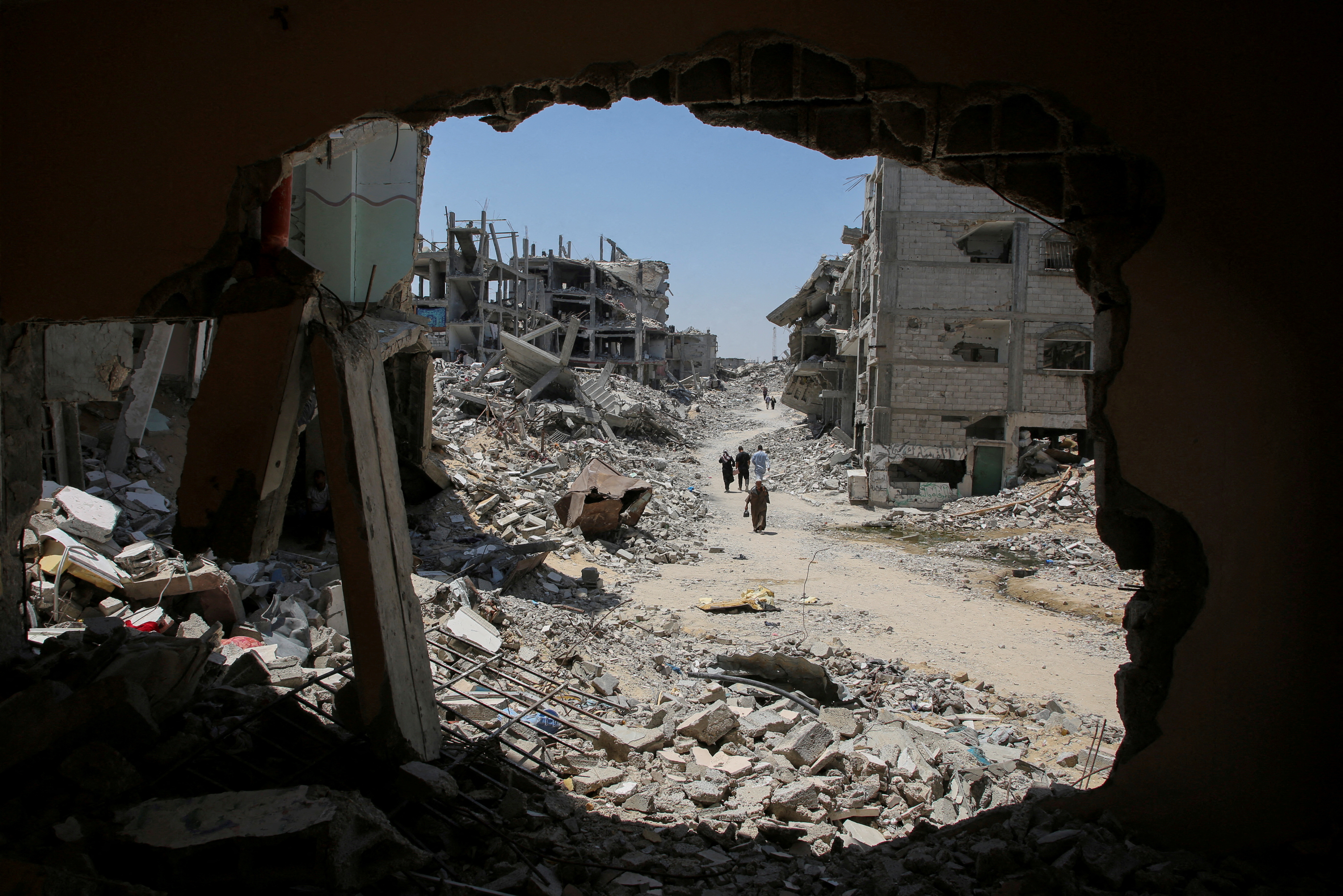The Israeli military bombed at least five crowded homes in northern Gaza early on Thursday with many casualties while a few hours earlier the US vetoed a U.N. Security Council (UNSC) resolution for a ceasefire in Gaza, drawing criticism of the Biden administration for once again blocking international action aimed at halting Israel’s war with Hamas.
Rescue operations were under way as many people remained missing or trapped under the rubble, medics said. Hamas media put the number of fatalities at 57 but there was no official figure immediately from the Gaza health ministry.
The Israeli military made no immediate comment but has repeatedly accused Hamas media of exaggerating the number of casualties.
Earlier on Wednesday, Gaza health officials said Israeli military strikes across the enclave killed at least 48 people.
Gaza medics said the incidents included attacks on houses and a school sheltering displaced people in central Gaza, bombing of a hospital in northern Gaza and air strikes on the humanitarian-designated area of Al-Mawasi and Rafahin southern Gaza.
Palestinian and U.N. officials say no place in the enclave is safe.
Hussam Abu Safiya, director of Kamal Adwan Hospital in Beit Lahiya, one of three medical facilities barely operational in the besieged northern area, said the hospital “was bombed across all its departments without warning, as we were trying to save an injured person in the intensive care unit” on Tuesday.
“Following the arrest of 45 members of the medical and surgical staff and the denial of entry to a replacement team, we are now losing wounded patients daily who could have survived if resources were available,” he told Reuters by text message.
“Unfortunately, food and water are not allowed to enter, and not even a single ambulance is permitted access to the north.”
There were 85 injured people, including children and women, at the hospital, six in the ICU. Seventeen children had arrived with signs of malnutrition as a result of food shortages. One man died of dehydration a day ago, Abu Safiya added.
Israeli operations in Gaza have focused for weeks on the northern edge of the territory, where the military has laid siege to three major towns and ordered residents to flee.
Residents in the three towns – Jabalia, Beit Lahiya and Beit Hanoun – said Israeli forces had blown up dozens of houses. Palestinians say Israel appears determined to depopulate the area permanently to create a buffer zone along the northern edge of Gaza, which Israel denies.
On Wednesday evening the 15-member council voted on a resolution put forward by 10 non-permanent members that called for an “immediate, unconditional and permanent ceasefire” in the 13-month conflict and separately demanded the release of hostages.
Only the U.S. voted against, using its veto as a permanent council member to block the resolution.
Robert Wood, deputy U.S. ambassador to the U.N., said Washington had made clear it would only support a resolution that explicitly calls for the immediate release of hostages as part of a ceasefire.
“A durable end to the war must come with the release of the hostages. These two urgent goals are inextricably linked. This resolution abandoned that necessity, and for that reason, the United States could not support it,” he said.
Wood said the U.S. had sought compromise, but the text of the proposed resolution would have sent a “dangerous message” to Palestinian militant group Hamas that “there’s no need to come back to the negotiating table.”
Israel’s campaign in Gaza has killed nearly 44,000 people and displaced nearly all the enclave’s population at least once. It was launched in response to an attack by Hamas-led fighters who killed 1,200 people and captured more than 250 hostages in Israel on Oct. 7, 2023.
Members roundly criticized the U.S. for blocking the resolution put forward by the council’s 10 elected members: Algeria, Ecuador, Guyana, Japan, Malta, Mozambique, South Korea, Sierra Leone, Slovenia and Switzerland.
“It is deeply regretted that due to the use of the veto this council has once again failed to uphold its responsibility to maintain international peace and security,” Malta’s U.N. Ambassador Vanessa Frazier said after the vote failed, adding that the text of the resolution “was by no means a maximalist one.”
“It represented the bare minimum of what is needed to begin to address the desperate situation on the ground,” she said.
Months of attempts to negotiate a ceasefire have yielded scant progress and negotiations are now on hold, with mediator Qatar having suspended its efforts until the sides are prepared to make concessions.
Although Israel’s assaults have been focused on Gaza’s north since last month, its strikes have continued across the territory.
In the Sabra suburb of Gaza City, the Palestinian civil emergency service said an Israeli airstrike targeted one of its teams during a rescue operation, killing one staff member and wounding three others.
The death in Sabra raised the number of civil emergency service members killed over the last 13 months to 87, the service said.
There was no immediate Israeli comment on the incidents.
Speaking during a visit to Gaza on Tuesday, Israeli Prime Minister Benjamin Netanyahu said Hamas would not rule the Palestinian enclave after the war had ended and that Israel had destroyed the Islamist group’s military capabilities.
Netanyahu also said Israel had not given up trying to locate the 101 remaining hostages believed to be still in the enclave, and he offered a $5 million reward for the return of each one.
Hamas wants a deal that ends the war, while Netanyahu has vowed the war can end only once Hamas is eradicated.







Click here to change your cookie preferences